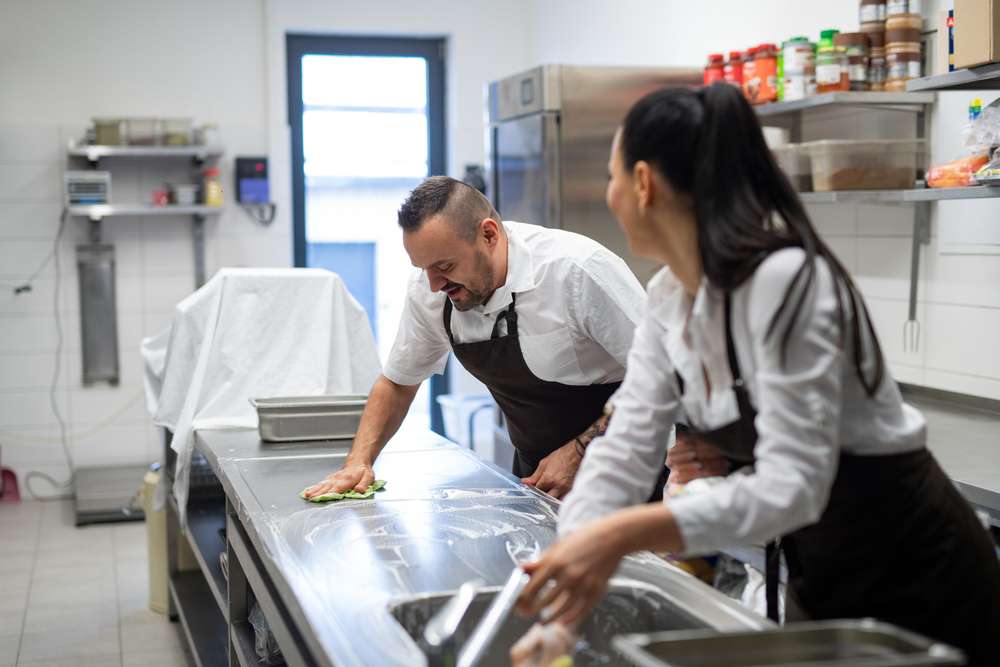Commercial Kitchen Cleaning Health Codes in Los Angeles
To maintain safe and sanitary conditions, commercial kitchens are required to adhere to health codes set forth by federal, state, and local agencies. These regulations aim to prevent foodborne illnesses and safeguard public health. It is necessary for any food-serving establishment to comply with these codes.
Failure to comply with these regulations can result in serious consequences, including fines, the closure of the business, and even legal action. In addition, maintaining a clean and sanitary kitchen is essential for meeting health code requirements and promoting customer satisfaction, and ensuring that your business continues to grow.
What Are Commercial Kitchen Cleaning Health Codes?
Commercial kitchen cleaning health codes are a set of guidelines and regulations set forth by national and local health authorities, including OSHA and Los Angeles County and the Department of Public Health. Their purpose is to ensure that food service establishments maintain a high standard of cleanliness and sanitation to prevent foodborne illnesses and contamination.
Adhering to these health codes is not just a matter of legal compliance but is also essential for the safety of your customers, the success of your business, and the well-being of your staff.
Common Areas Inspected During Routine Health Inspections
Health inspectors routinely visit commercial kitchens to assess compliance with health codes. Here are the common factors they inspect:
1. Food Storage and Labeling
Inspectors check that food items are stored at the correct temperatures and that labels are accurate and up to date. Proper storage and labeling prevent cross-contamination and food spoilage.
2. Clean Surfaces: Floors, Walls, and Countertops
Inspectors scrutinize all nonfood and food-contact surfaces for cleanliness. They look for accumulated grime, mold, and other unsanitary conditions. Clean surfaces are vital for preventing the spread of harmful bacteria.
3. Equipment Cleaning
Kitchen equipment is a breeding ground for grease and grime. Inspectors ensure that equipment is cleaned and maintained to prevent contamination and damage.
4. Handwashing Stations
Proper handwashing is a critical aspect of food safety. Inspectors verify the presence of accessible handwashing stations and assess staff compliance with hand hygiene protocols.
5. Temperature Control
Inspectors measure the temperatures of stored and cooked food to ensure that they meet health code requirements. Proper temperature control is essential to prevent bacterial growth and foodborne illnesses.
6. Pest Control
Inspectors check for signs of pests, such as rodents or insects, and assess the measures in place to prevent infestations. Proper pest control is crucial for maintaining a clean and safe kitchen.
Proper Food Storage and Labeling Requirements
Food storage and labeling are key components of kitchen cleanliness and food safety. To meet health code requirements:
– Store raw and cooked food separately to prevent cross-contamination.
– Maintain proper temperatures: Refrigerators should be at or below 40°F (4°C), and freezers should be at 0°F (-18°C).
– Use food rotation systems to ensure older items are used before newer ones.
– Label all food items with their preparation date and expiration date.
– Ensure that labels are clear and easy to read.
– Implement the “First In, First Out” (FIFO) method to use older food items before newer ones.
Maintaining Clean Surfaces: Floors, Walls, and Countertops
Clean surfaces are the foundation of a sanitary kitchen. To meet health code requirements:
– Clean floors, walls, and countertops daily.
– Use suitable cleaning agents and sanitizers to remove grease, grime, and debris.
– Repair any damaged surfaces, including tiles, to prevent cracks where bacteria can thrive.
– Regularly inspect and clean floor drains to prevent odors and blockages.
– Implement a deep cleaning schedule to address hard-to-reach areas and hidden corners.
Best Practices for Cleaning Ovens, Fryers, And Grills
Kitchen equipment, including ovens, fryers, and grills, must be regularly cleaned to prevent contamination and maintain functionality:
– Develop a cleaning schedule for each piece of equipment, including daily, weekly, and monthly tasks.
– Follow manufacturer guidelines for cleaning and maintenance.
– Use suitable cleaning agents and degreasers for different equipment.
– Train kitchen staff on proper cleaning procedures for each piece of equipment.
– Regularly inspect equipment for signs of wear and damage, and address issues promptly.
Handwashing Policies
Proper handwashing is a fundamental aspect of food safety. To meet health code requirements:
– Ensure that handwashing stations are easily accessible and equipped with soap, warm water, and disposable towels or air dryers.
– Implement a strict handwashing policy for all kitchen staff, including when to wash hands and how to do it properly.
– Train staff on the importance of hand hygiene in preventing cross-contamination.
– Conduct routine handwashing checks to ensure compliance.
Temperature Control When Cooking or Storing Food
Temperature control is vital to prevent bacterial growth and foodborne illnesses:
– Invest in reliable thermometers to measure the temperature of stored and cooked food.
– Develop a system for checking and recording temperature logs regularly.
– Ensure that all food items are stored and cooked at the correct temperatures.
– Regularly calibrate thermometers to ensure accuracy.
Pest Control in Your Restaurant
Pest control is a critical component of kitchen cleanliness:
– Seal all entry points that pests may use to access the kitchen.
– Implement regular pest control measures, such as inspections and treatments.
– Train staff to recognize and report signs of pest infestations.
– Keep food storage areas clean and free of crumbs, which can attract pests.
Maintain Commercial Kitchen Health Codes with Professional Cleaning Services
Adhering to commercial kitchen cleaning health codes is a necessary aspect of running a successful food service establishment. It ensures the safety of your customers, the efficiency of your kitchen, and your compliance with legal regulations.
By focusing on proper food storage and labeling, maintaining clean surfaces and equipment, emphasizing handwashing, controlling temperatures, and implementing robust pest control measures, you can create a kitchen that is not only a hub of creativity but also clean and safe.
Contact Safe Kitchens today to make sure your commercial kitchen is clean and in line with all local, state, and federal health codes.

